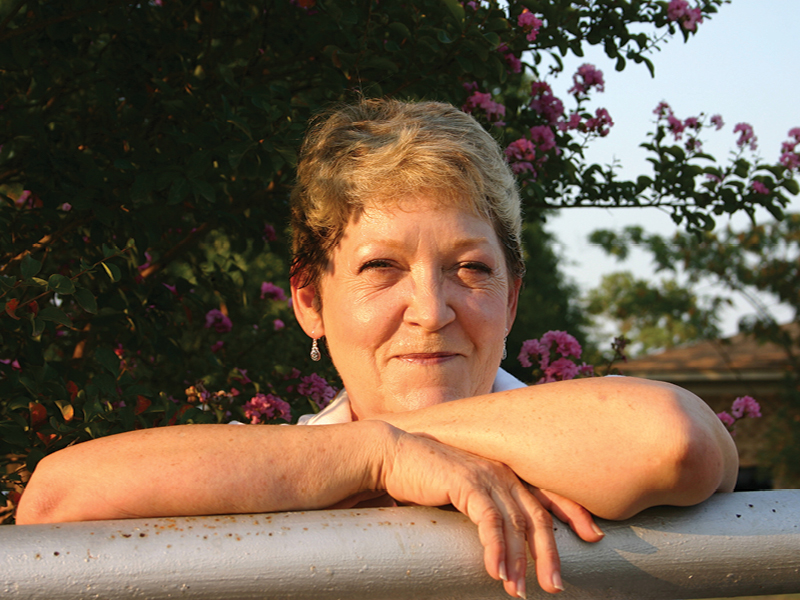By Tom Geddie
For Jenny Wingfield, country life is the life. It shows in the Gilmer resident’s work, from her first published screenplay, the bittersweet coming-of-age movie “The Man in the Moon,” to her upcoming debut novel, tentatively titled “Moses Never Closes.”
The movie, released in 1991, drew comparisons to director Robert Mulligan’s earlier, classic “To Kill a Mockingbird.” Set in rural Louisiana in the 1950s, it tells the story of Dani (Reese Witherspoon, in her first movie role) who, during the summer of her 14th year, falls in love with a 17-year-old boy, Court Foster (Jason London) who likes her as a friend but falls for her older sister, Maureen (Emily Warfield). Sam Waterston and Tess Harper played the girls’ parents in this gem of a movie.
In fact, acclaimed movie critic Roger Ebert wrote, “When this movie was over, I sat quietly for a moment so that I could feel the arc of its story being completed in my mind. They had done it: They had found a way all the way from the beginning to the end of this material, which is so fraught with peril, and never stepped wrong, not even at the end, when everything could have come tumbling down. ‘The Man in the Moon’ is a wonderful movie, but it is more than that, it is a victory of tone and mood. It is like a poem.”
That was quite a debut script for Jenny. Among other screenplays, she’s since written the feature film “The Outsider” starring Naomi Watts and was one of the writers for “The Lion King II: Simba’s Pride.” She did “A Dog Named Christmas,” broadcast in December, for Hallmark Hall of Fame, and “The Lost Valentine,” to be filmed in 2010 for a 2011 Hallmark broadcast.
Jenny also is co-producing her script “Talking in Bed” with Sissy Spacek, Helen Bartlett, and producer/director Tony Bill.
While many writers do novels first, then turn to screenplays, Jenny did it backwards because getting into screenwriting turned out to be easier for her.
“One of the biggest difference s in a screenplay is that you write in short strokes, like watercolor. You have to be economical in what you put on the paper,” she said. “In a novel, you can think out loud and go into your characters minds and explore with a lot more freedom. Screenplays, in a way, are good training ground for novels. You have to be structured: tension builds and lets up, characters’ problems get worse and worse and worse before they let up. The screenplay structure can be a lifesaver.”
Jenny said it took her about a year and a half to get an agent for her novels.
“When it happened, it happened all at once. There’s just a time for things, and when it’s right you can’t stop it,” she said. “I guess you could, but . . .”
The novel, part of a two-book deal with Dial negotiated by New York-based LJK Literary Management, is due for international publication August 3. Set in rural Arkansas in the mid 1950s, it tells the story of hard times, good news, love, and loyalty in the Moses and Lake families through the eyes of a teenage girl named Swan.
If that basic setting – substitute rural Arkansas for “The Man in the Moon’s” rural Louisiana and Swan for Dani – seems familiar, that’s because parts of both stories – like those of most writers – come from Jenny’s own rural life.
“There are elements that are real,” she said. “A lot of the people are loosely based on my family, very loosely. A lot of the characters I’ve known are kinda melded into each other in the book.
“My father was a Methodist minister who went for four years without a church. It was a hard time,” she said. “In the book, the preacher who doesn’t have a church has to move in with his mother-in-law, and the house is sandwiched between a grocery-store service station and a bar that’s open all night. That’s where he is – the place where he and his wife have to live.
“Everything I write has people I’ve known in it,” she said. “‘The Man in the Moon’ had a family we knew and loved, and their son was killed the way the boy was killed in that movie. In reality, it happened over five years.
“And I never went skinny dipping until I was 33,” she said, laughing.
The stories grow out of the characters.
“John Steinbeck said to take the most interesting characters you can come up with, put them together, and see where they go,” she said. “I’m fascinated by what happens with life when you’re going along in one direction and you think this is what it is, and then something happens. Writer’s Market said a story kinda boils down to once upon a time everything was going along fine, and then something happened to change it. I love to let something happen and see what I get.”
Jenny loves the Gilmer area, too, where she lives on a small spread with her daughter Lori and an ever-changing menagerie that includes an accumulation of rescued dogs, three cats, two goats, two donkeys, four horses, and now three calves.
“We buy raw milk from Bear Dairy between Gilmer and Winnsboro, and my daughter came home from there one day and said I had to have this calf because it was the most beautiful thing,” Jenny said. “I said don’t get one, because it would get lonely. She came home with three Jersey-Holstein crosses. We bottle feed them and pasture them and they have a nice stall to sleep in. We have no idea what we are going to do with them. The females probably will become dairy cows, and the male will be a decoration.”
The trees, the water, and the “relaxed and gentle” people attract Jenny to the area.
She’s stayed in California for weeks or months at a time for her work, but never considered herself a resident there.
“I’m not a city person,” she said. “Great entertainment for me is to plant something or fool with the animals or just be outside. You can’t do that in Los Angeles; the only thing you can do there is to go somewhere. There’s no place but inside your home that you’re not looked at, that you can be totally unselfconscious.”
Writing – telling stories – is as natural to Jenny as being outdoors.
“That’s who I am. There were six of us kids, and mother would line us up like little ducks and walk to the town library in Robeline, Louisiana. It was a little house converted into a library. There was also a grocery store not much bigger than my kitchen, a post office, a drugstore, a hardware store, and about 10 churches and a railroad track going through town. We would check out the limit – I think it was six books each – and would read for days.
“Daddy could always turn a phrase. He had fun with words and music. Us kids would eat breakfast and take off and play in the country, then come home for lunch and back for supper. At night we would catch lightning bugs and then go to bed. I remember how honeysuckle smelled. You can’t grow up in Louisiana without feeling some kind of magic.”
Moving every two or three years from one small town to another went along with Jenny’s dad’s job as a preacher.
“One stoplight was a big town,” she said. “We lived in Dallas one year when I was in eighth grade and that was like an alien planet to me.”
The nostalgic, rural settings for so many of her stories are no surprise.
“What’s influenced my writing is that people who are tuned in to the country, to natural things, have an outlook that is real obvious – a practical thing, but coming from a place where you appreciate what you have. You don’t always have to have more. A disconcerting thing about the world now is that people always seem to want more, but we can only be happy it we can appreciate what we have.”
Right at the top of Jenny’s literary influences is Mark Twain, “of course.” She also cites Elizabeth Kata’s “A Patch of Blue,” Frank McCourt’s “Angela’s Ashes,” and Neil Gaiman’s “Anansi Boys.”
“Mark Twain could tell a truth in a way that’s not like sermonizing, but he teaches and entertains at the same time. The truth in his writing pulls me the most. The best writers are just storytellers.”


